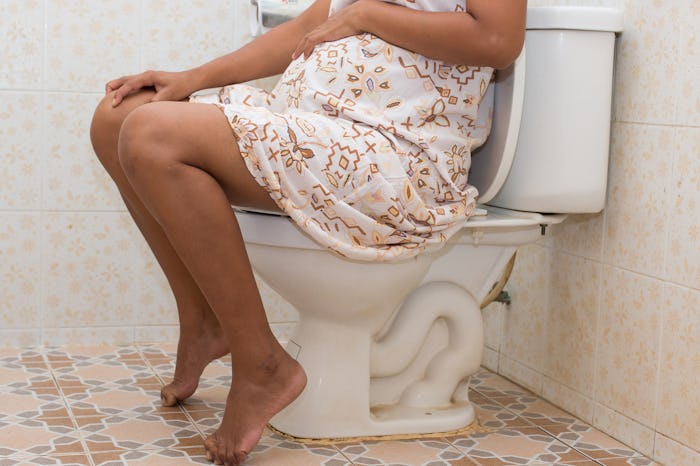Pregnancy

There Are A Few Reasons Why It Hurts To Poop During Pregnancy & All Of Them Stink
There seems to be no end of embarrassing miseries that befall upon a pregnant woman. During my last pregnancy, it felt like they were all compounded together. Have you ever passed gas at an art gala? Let me tell you, it's even more horrifying than it sounds. And smells. (I'm scarred for life.) Most pregnant moms know that a pregnant digestive system is a wonky digestive system, but pooping is the worst. Whether you're going too often or not often enough, it's never right. And why does it hurt to poop when you're pregnant? So many poopy questions here.
Unfortunately, there are myriad conditions that can cause women to experience painful bowel movements during pregnancy. As the International Urogynecology Journal reported, it's not uncommon at all. In fact, this uncomfortable symptom can be linked to many disorders and diseases ranging from run-of-the-mill constipation to a type of fetal incontinence that is associated with painful gas and bowel movements. Also, women with gastrointestinal diseases may find their problems exacerbated with pregnancy, noted the Journal of Clinical and Diagnostic Research. That means that if you have a disorder like inflammatory bowel disease or Crohn's, you might notice your symptoms worsen with the hormones and bodily pressures of pregnancy, according to the journal.
I asked Adrienne D. Zertuche, M.D., MPH OB-GYN at Taylor, Suarez, Cook, Carroll, and Khan, about why it hurts to poop during pregnancy. And let me tell you, it's kind of brutal — to your butt. The most likely cause, according to Zertuche, is something I know a ton of us deal with during pregnancy, if only because of how much it comes up in conversation at the doctor's and with friends: hemorrhoids. Which, as explained by the Mayo Clinic, are veins that become swollen in the anus or lower rectum. They're also ridiculously common, with three out of four adults developing them at some point in their lives.
Zertuche tells Romper, "The hormonal changes that occur in pregnancy slow the speed at which food and feces move through the bowels. Constipation leads to infrequent and lumpy or hard stools, straining during defecation, and a sensation of incomplete evacuation." It causes irritation to the delicate tissue of your down and out canal, and boom come the hemorrhoids.
Your risk of getting an itchy, swollen bum goes up in your third trimester. Zertuche says, "In the third trimester and postpartum period, pregnant women are predisposed to hemorrhoids because of the increase in their total blood volume and the natural swelling that occurs in the genital area." Oh joy. She suggests that if the pain and constipation are getting really bad, call your provider. They can recommend treatments and guide you on how to make things move more smoothly.
For some of us, our problems are a little less common. I have a condition known as deeply infiltrative endometriosis. That means that I have endometrial tissue all throughout my abdomen (and elsewhere). One of those places is my intestines. Every month when I get my period, and again when I ovulate, going to the bathroom feels like someone poking my insides and my rectum with a blunt knife. It's crippling. There are days when the pain is so intense I cry out. During the beginning of my pregnancy, this pain mostly resolved itself. This is because the bump of progesterone from pregnancy helps reduce the symptoms, according to Endometriosis.org, and the hormonal fluctuations of pregnancy are different from those of your regular cycle. However, mine came back with a vengeance during the third trimester. There was simply too much weight pressing on too much scar tissue. The pain was excruciating. It was like I had lightning shooting into my genitals each time and I couldn't decide if I should sit on an ice pack or call a priest.
Trust me, no one wants to live on a donut pillow, especially during pregnancy. But know that any pooping pain you feel during pregnancy is probably common, unless you've had a previous issue. Either way, reach out to your doctor for relief and treatment options.
Studies referenced:
Jorien van Brummen, H. (2006) Defecatory symptoms during and after the first pregnancy: prevalences and associated factors, the International Urogynecology Journal, https://link.springer.com/article/10.1007/s00192-005-1351-0
Kazemi, F., Nahidi, F. Kariman, N. (2017) Disorders Affecting Quality of Life During Pregnancy: A Qualitative Study, Journal of Clinical and Diagnostic Research, https://www.ncbi.nlm.nih.gov/pmc/articles/PMC5449858/
Experts:
Adrienne D. Zertuche, M.D., MPH OB-GYN at Taylor, Suarez, Cook, Carroll, and Khan in in Atlanta, Georgia.
This article was originally published on